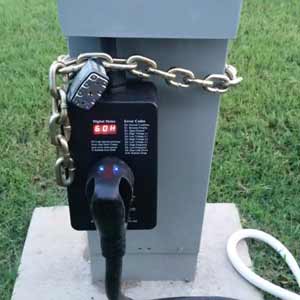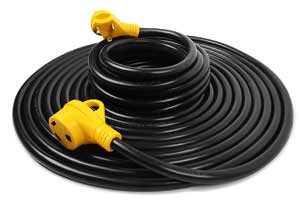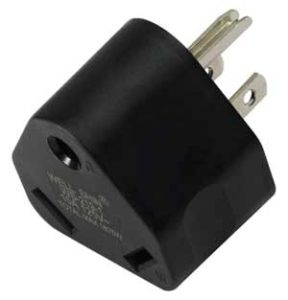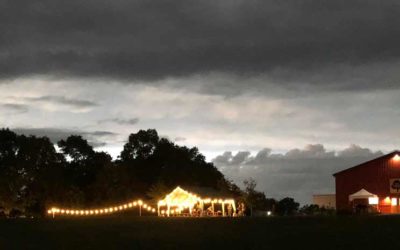RV extension cords and adapters

There’s nothing worse than not being able to hook-up to electric service at an RV park or state or national park. Here’s how to be prepared.
Many RVs have onboard generators. Still, others have solar panels on top or owners use portable panels to capture electricity from the sun. And some RVers — most travel trailer owners — have a portable generator — or two — to help them overnight when there’s no electric available. Here’s a good overview of what you should have in your RV Electric Kit.
Troubles getting connected
After RVing all over the U.S. for 14 years and enduring horrid, old, and broken down roadside RV parks, we finally joined Harvest Hosts this past summer. We couldn’t be happier. For the (now) $79 annual fee, you gain access to a network of hundreds of farms, wineries, breweries, museums, and other places that offer free overnight stays for RVers, only asking that you patronize their business as a “thank you.”
We’ve been to some great places just this fall (look for our reviews soon), much better than those skanky old off-the-highway RV parks. The only issue is having enough electricity to stay more than one night (or two). Sure, some places offer (or you can ask) for an electric hook-up, but often times it’s a 15- or 20-amp connection with a long extension cord. That’s okay to keep the batteries charged, some basic appliances used, and to top off our phone and iPad batteries.
And how many times have you been to an RV park or state or federal park where only 20- or 30-amp service was available? If you didn’t have adequate heavy duty extension cords, electrical adapters, and even a surge protector, you could be in real trouble — pretty much boondocking unexpectedly!
Surge protector
 Let’s start with a “must do.” Your RV’s electrical system is, in many ways, much more fragile than the one at your home. Especially considering how the RV parks and government properties you stay at may have been built years ago when electrical standards were not what they are today, local building codes aren’t consistent from locale to locale, and some of the electrical services may have degraded over time or even put in incorrectly from the start.
Let’s start with a “must do.” Your RV’s electrical system is, in many ways, much more fragile than the one at your home. Especially considering how the RV parks and government properties you stay at may have been built years ago when electrical standards were not what they are today, local building codes aren’t consistent from locale to locale, and some of the electrical services may have degraded over time or even put in incorrectly from the start.
To protect your RV’s electrical components — especially sensitive systems like computers, stereos/radios, and TVs, you need a surge protector. We’re fans of the more-is-always good theory, so two very highly-reviewed models include the Progressive Industries EMS-PT30X (for 30 amp needs) and Progressive Industries EMS-PT50X (50 amp protection). It’s ideal to get a protector that can be locked onto the electrical post to prevent theft.
Extension cords

If you need to access electric far from your RV, forget that stuff you can buy at Home Depot, Menards, Lowes, and other hardware or building supply store. You want RV-grade, heavy duty extension cords. Lighter duty extension cords will overheat and potentially catch on fire — not a situation you want with your RV.
Some of the best extension cords we know of come from Lavotla. They have a great 30-amp, 50-foot model (also comes in 25 feet). There’s the Vetomile 30′ 50-amp extension cord, and for truly gigantic cord fans, the Mophorm 50′, 50-am cord. A bit pricey, but they are weatherproof and should last for decades with proper care.
Adapters

A smart RVers always keeps a good collection of adapters handy to meet any needed situation. We keep two of each, as we’ve been prone to forget one or two as we set them on the top of the electric post at the RV park while we’re packing up, then drive away without a second thought.
Your RV Electrical Kit is going to need a few items:
• 15-amp to 30-amp plug
• 30-amp to 50-amp plug (don’t go 15 to 30 to 50, please!)
With a little bit of planning, you can be ready for almost any electrical situation. What’s in your RV Electrical Kit? Share your comments and ideas in the comments below.

Jim & Debbie Tome
Hi! We’re Jim & Debbie Tome and we run All Things RVing, the online destination for, well, everything about RVing, including tips and advice, RV park reviews, trip planning and destinations, our experiences and insights while RVing, and even some food and drink (and much more!) recipes, reviews, and shares along the way. We hope you enjoyed this article and come back often. You can even subscribe (above!) and you’ll get a nifty little email each time we publish a new article. Don’t worry, we never share your email or personal info with anyone, any website, or any company. Thanks for reading!
How to get rid of RV odors
No one likes odors in their RV. The small space and reduced ventilation can concentrate odors and make them unbearable at times. Find out what you can do. There are many causes of bad odors in RVs. Even just things like dirty laundry, pets, and even cooking can cause...
Point Labaddie Brewery in Labadie, Missouri
A small, roadside craft brewery off of old Route 66 was a surprisingly wonderful overnight stop — and a great alternative to noisy, dirty, and possibly dangerous overnight stops like a Walmart parking lot or truck stop. We did a lot of traveling in 2018. We're...
Propane heater safety tips
When you need an extra heat boost in your RV during cold or chilly weather, a propane heater is a great idea. Just follow a few safety tips. If you're winter camping in your RV or an unexpected cold snap hits where you're at, you want to stay warm. There's nothing...

Visit some of our most popular pages and sections of our website.
| Advice & Tips | Reviews & Recommendations |
| Places & Sites | Food & Drink |
| Connect With Us | Contact Us |

All Things RVing ![]() P.O. Box 313, Sycamore, Illinois 60178
P.O. Box 313, Sycamore, Illinois 60178 ![]() 815-508-3878
815-508-3878 ![]() info@allthingsrving.com
info@allthingsrving.com




0 Comments